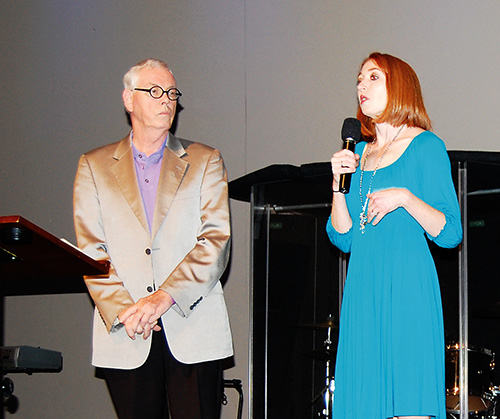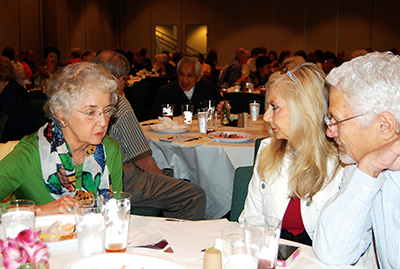By Elsa Baughman
RIDGELAND – Mike Quayle, who has been living with Alzheimer’s disease since 2012, was the special guest speaker at the first of a three-part series called “Dementia: Diagnosis, Care, Prepare,” sponsored by St. Dominic’s Behavioral Health Services. The conference was held Thursday, April 23, at Broadmoor Baptist Church.

Sarah Murphy, program coordinator for the Mississippi Alzheimer’s Association, introduces guest speaker Mike Quayle, at the conference on dementia. (Photo by Elsa Baughman)
Quayle was diagnosed in January 2013 after four months of testing. He shared his post-diagnosis journey, saying he will not let the disease slow him down. “I am going to fight it as long as I can,” he told a crowd of about 300 people, some of them caregivers or family members of people suffering from this kind of dementia. He said he writes down in his journal what he does every day because he can’t remember what he did a few days or even a month ago. He has good days, “Like today, I feel normal,” but there are times when his wife tells him he has been in a fog, staring at a wall for most of the day.
He shared two things which are helping him to cope with Alzheimer’s: stay active and relax. He still works 20 hours a week in a hardware store, is active in his church, helps around the house, spends time with his grandchildren, and drives to work. “I am afraid that if I slow down I will start losing it,” he said.
He noted that during one of his recent visits, the doctor told him, “Mike, eventually I am going to have to take the car keys away from you.” He said it was very hard for him to acknowledge that sooner or later he was going to have to stop driving, but he added that having the doctor deliver the news took that burden off his wife and daughter.
The other thing that is helping him is to relax. He has being practicing relaxation since one day, when his wife saw him very agitated, she told him, “Mike, why don’t you sit down, relax, and let the Lord breathe over you.” He said this has been very comforting to him since he still has a sense of who God is. So every time he is having a tough day, his wife reminds him to relax.
Teresa Chappell, a nurse manager at St. Dominic’s Behavioral Health Services, shared information on the signs and symptoms of dementia and Alzheimer’s disease, its stages and progression and pointed out some tips on how caregivers can deal with the illness. For example, she recommends providing only two alternatives if there is a need to give a patient an opportunity to make a choice. “If she wants to choose which dress to wear, show two dresses and tell her to chose one.”
She said at the early stage of the disease the person starts forgetting conversations, knowing people, or recognizing the meaning of objects. As the disease progresses, mood changes, such as frustration, depression and agitation, set in. At the last stage there is memory loss across all phases, sleep disturbance, loss of bodily functions, etc.

Jon Gilbert (left) and Robbin and Gerald Vance play a game as patient-caregiver to describe having pain without using words associated with pain.
Dr. David Richardson, medical director for geriatric psychology at St. Dominic’s Behavioral Health Services, spoke about medications and their effects on the elderly and the expectations of a geriatric psychiatric facility.
For information about the next two conferences, June 18 and Aug. 20, call 601-200-3147.
